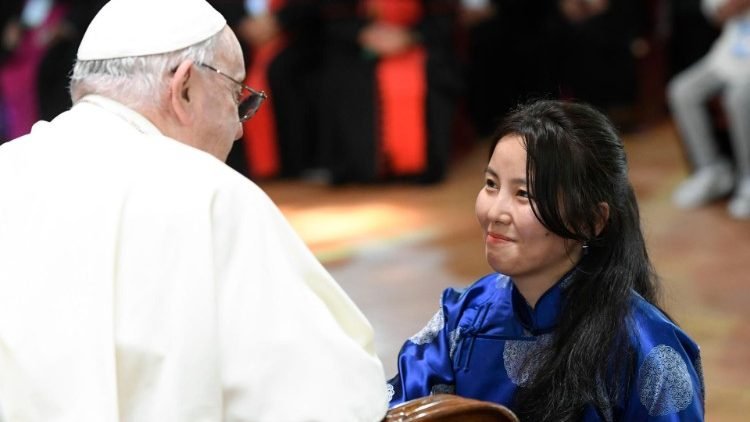Our Editorial Director reflects on how the words of Mongolian pastoral worker Rufina Chamingerel, and the points highlighted by Pope Francis, offer a precious indication for the work of the Synod on synodality.
By Andrea Tornielli
Her name is Rufina Chamingerel. She is a pastoral worker who addressed a few words to Pope Francis during the meeting in the cathedral of Ulaanbaatar on Saturday, 2 September.
She said: “I still don’t know how to translate the word ‘community’ into our language… Our Church is in that phase typical of children who constantly ask their parents questions… In my opinion, we are very lucky insofar as we do not have many books of catechesis in our language, but we have many missionaries who are living books. … I would like to emphasize the effectiveness of the Synod on Synodality. During the Synod, our faithful, especially pastoral workers, were able to gain an even better understanding of the true nature of the Church, and a more complete perspective for our parishes.”
This is a precious indication for the Synod on synodality coming from the “small Catholic flock” of the Mongolian steppe. The synodal work experienced here made “the true nature of the Church better understood.”
Taking the floor after Rufina, in his speech to the Catholics of Mongolia, Pope Francis wanted to “stress this word: communion”. Because, he explained, “the Church cannot be understood in merely functional terms. No, the Church is not a business (…). It is something else. The word ‘communion’ explains well what the Church is. In this body of the Church, the bishop is not a manager of its diverse elements, even perhaps based on the principle of majority, but leads on the basis of a spiritual principle, whereby Jesus himself becomes present in the person of the bishop in order to ensure communion in His mystical Body.”
“L’Eglise est une Communion” is the title of a book written in the early 1960s by Dominican Father Jérôme Hamer, later Secretary of the Congregation for the Doctrine of the Faith and a cardinal. The ecclesiology of communion, affirmed the 1985 Synod of Bishops, is “the central and fundamental idea in the documents of the Second Vatican Council”.
Pope Francis has explained several times that the majority principle of the democratic systems cannot be applied to the life of the Church and does not respect its nature.
In the Mongolian capital, the Pope said: “Unity in the Church is not about order and respect, nor is it simply a good strategy for ‘teamwork’; it is about faith and love for the Lord, about fidelity to him. Consequently, it is important for all ecclesial elements to remain firmly united around the bishop, who represents Christ alive in the midst of his People, and to build up the synodal fellowship that we preach and that greatly assists the inculturation of the faith.”
The upcoming Synod is an opportunity grow in experience and awareness of what it means to live ecclesial communion, not according to individual or party “pre-packaged” pseudo “agendas”, but by rediscovering communion in prayer and in mutual listening, letting everyone be guided by the Spirit and thus putting into practice a pivotal dimension of being Church which has been present in the Church since its origins.
When receiving the Italian “E’ Giornalismo” Award on 26 August, Pope Francis said: “Precisely in this time, in which there is much talk and little listening, and in which the sense of the common good risks weakening, the entire Church has embarked on a journey to rediscover the word ‘together’. We must rediscover the word ‘together’. Walk together. Question together. Undertake community discernment, which for us is prayer, as the first Apostles did: this is synodality, which we would like to make a daily habit in all its expressions. Precisely for this purpose, in a month’s time, bishops and laity from all over the world will gather here in Rome for a Synod on synodality: listening together, discerning together, praying together.”
From the heart of Asia, from Mongolia, from a nascent Church so distant from Rome in terms of kilometres, but so close to the heart of the Pope, therefore, comes a lesson for the Synodal Fathers and Mothers who in a few days-time will gather around the Successor of Peter to pray, listen to each other and discern together how to proclaim the Gospel to the women and men of our time.



